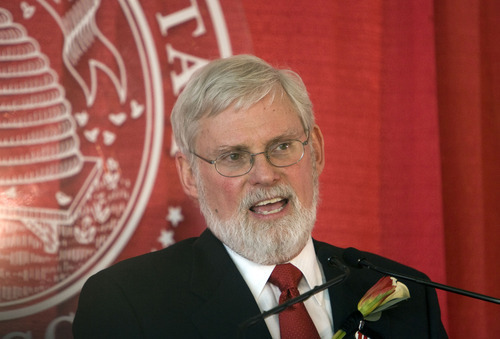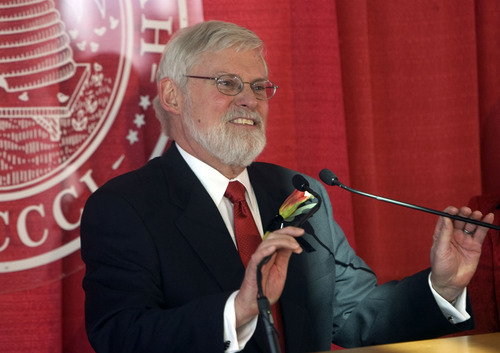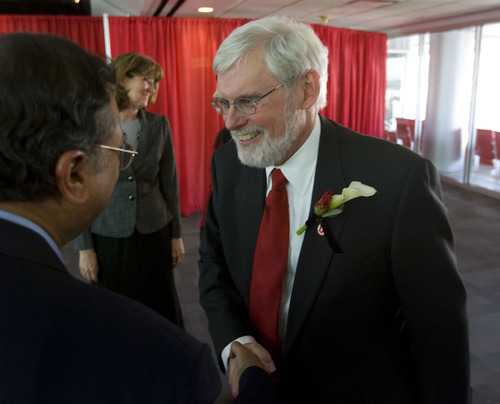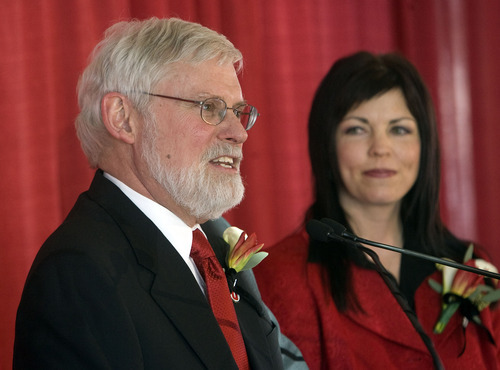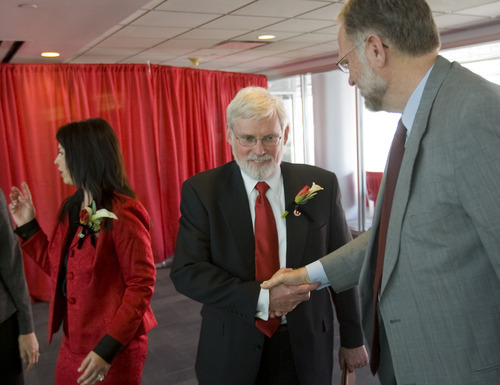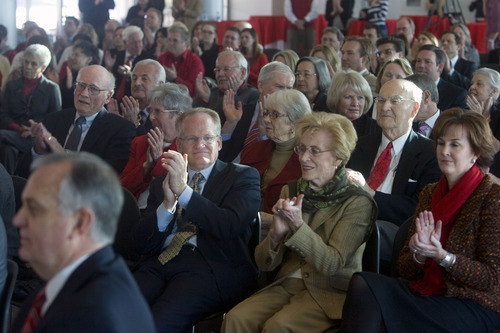This is an archived article that was published on sltrib.com in 2012, and information in the article may be outdated. It is provided only for personal research purposes and may not be reprinted.
Vowing to bolster undergraduate education, David Pershing has accepted the title of 15th president of the University of Utah.
The state Board of Regents tapped the longtime provost Friday to succeed Michael Young and interim president Lorris Betz at the helm of the state flagship. Regents chose Pershing, a chemical engineer, over his University of Kentucky counterpart, Kumble Subbaswamy, in what boiled down to a two-man race that began months ago with 80 candidates.
The Regents interviewed the finalists and deliberated in private Friday, then convened in open session before an audience of donors and administrators to unanimously endorse Pershing, 63. His nomination drew a standing ovation before Regents could even formally vote.
"In every capacity he has been outstanding and distinguished himself," said Regents chair David Jordan. Not since the ascension of Chase Peterson in 1983 have the Regents hired a U. president from its administrative ranks. Three presidents have come and gone since then.
"I never expected to be standing here today when I came here as an assistant professor," said Pershing, who was joined at the podium by his wife, Sandy. "I've come to know and love this institution very deeply. I know how great the faculty are here."
He said he will gather campus leadership in the coming weeks to craft a vision to guide the school's future.
"Improving undergraduate education is going to be a priority for my administration," Pershing said. "I want every well-prepared high school student to think about coming to the University of Utah. We want students to not only come here but graduate in a timely manner."
Pershing's selection follows a pattern that has become familiar for Regents in the past decade. They conduct national searches to fill presidential posts on Utah campuses, only to choose a finalist from Utah or with ties to Utah. The institutions, meanwhile, often go out of state to hire senior administrators.
The presidential base salary is $348,000. But Pershing's compensation is expected to include a robust package of benefits that could include deferred compensation.
After a process cloaked in confidentiality, the U. search committee forwarded four names to Regents, but two withdrew rather than have their candidacies made public.
Publicly, officials said they were thrilled with the caliber of the finalists, but some observers were disappointed the Regents had only two provost-level candidates from which to choose.
"The others [who withdrew] weren't even willing to stand up to be candidates," said Robert R. Johnson, the chair emeritus of the U.'s computer science department. "It's a sad commentary on the prestige of the University of Utah."
U. trustees chair Clark Ivory, a member of the search committee, praised Subbaswamy, a physics professor who has been a provost or dean at three universities.
"He is gracious, he is articulate and he deserves to be a university president," he said. But Ivory could hardly contain his enthusiasm for Pershing, drawing on a football analogy to describe his hopes for the new president.
"Hiring Dave Pershing is akin to hiring Coach [Kyle] Whittingham when Urban Meyer left. They were big shoes to fill and there was already a lot of momentum," Ivory said. In a few short years under the former defensive coordinator's leadership, the Utes went undefeated and won the Sugar Bowl in 2009.
"We expect nothing less from President Pershing," Ivory said. Like Whittingham, he added, Pershing has played defense, but as the leader he now has to learn offense.
That will mean aggressively advancing the university's interests among lawmakers, making hard decisions about which units merit support, and getting out of Salt Lake City to forge relationships around the state, Ivory said.
"We want people to love their Snow Colleges, but we also want them to love the University of Utah. This has to be Utah's university," he said.
Utah State University President Stan Albrecht, himself a former USU provost, was pleased with Pershing's selection, citing his efforts to promote collaboration between the state's two research campuses.
That sentiment was echoed by Commissioner of Higher Education William Sederburg, who provides policy guidance over the state's system of eight public campuses.
"He will pull all the institutions together on a common agenda," he said.
The choice of Pershing also drew praise from numerous campus leaders.
"I believe that Dave will be an outstanding president who will continue to build on his record of change and improvement at the U.," wrote Academic Senate President Patricia Hanna in an email.
Pershing has been renowned for his collegiality, and the U.'s academics will be in safe hands under his leadership, according to Jim Jardine, a Salt Lake City lawyer who chaired the U. trustees in the 1990s and was later a state Regent.
"He is a truly unique combination of academic excellence, as a researcher and academician," Jardine said. "He has a national reputation, but even more important are his personal qualities of fairness and integrity. It's impossible to overestimate the impact of his leadership on the positive direction of the university."
Meet David W. Pershing
The U.'s 15th president joined the U. as a chemical engineering professor in 1977 and quickly ascended administrative ranks to become dean of the College of Engineering. In 1998, then-president Bernie Machen promoted him to provost, a senior vice president serving as the U.'s top academic post. In that capacity he has hired 21 deans and 10 vice presidents. He also had a busy research program and founded the Center for Simulation of Accidental Fires and Explosions.


